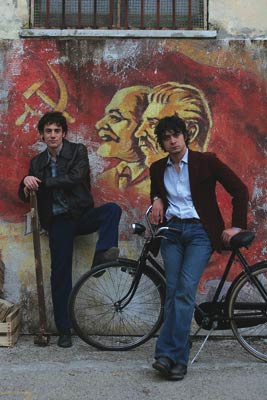
Here and now in America, interest in 1970s political drama has been mostly confined to books. Novels like Dana Spioto’s riveting Eat the Document trace the intertwining of pop culture and the traditions of radical dissent, working themselves into mostly underground psychic explosions. We Yankees are, after all, corporate creatures with quaint-seeming pasts. In Italy, however, the post-1960s upheavals were more operatic, out in the open. And spectacular intra-family clashes between the Catholic Church and the Communists, Brigate Rosse and the Mafia, have since been significantly expressed in Italian cinema, by auteurs both great and small. But the subject matter is at its most rich and accessible in the six-hour saga Best of Youth, an emotionally charged family chronicle that ends with grandma and grandson living on an island with a volcano.
The same team that wrote Youth created this film (with its dopey title), so it’s very tempting to view this 100-minute movie as a recap of the longer masterwork. Here also, two brothers verge into warring camps, one sweeps left, the other hard right, while retaining something like pained respect for one another. (They also ache for the same woman, the gorgeous Francesca, played by Diane Fleri.) Likewise, this film ends with a grandmother and grandchild sorting out the ruins that romanticized passions left behind, and a man encountering his own youth for the first time.
While subtly constructed, Brother is nowhere near as pleasurable (or as resonant) as Best of Youth. The camera work is restless and glancing, though slowing down in the more erotic scenes to open and let us in. Yet the most momentous moments pass as if they had been casually glimpsed. No doubt this is intentional, but it doesn’t exactly match the high melodrama to the ultimate possibilities of the medium. It’s subtly cool, more like a novel.
So let’s hope we’re ready for a flip-flop. Hollywood movies of ’70s explosions: Bernadette Dohrn, Stonewall, and My Lai rather than happy days and boogie nights, before our past is lost on the best of youth.



